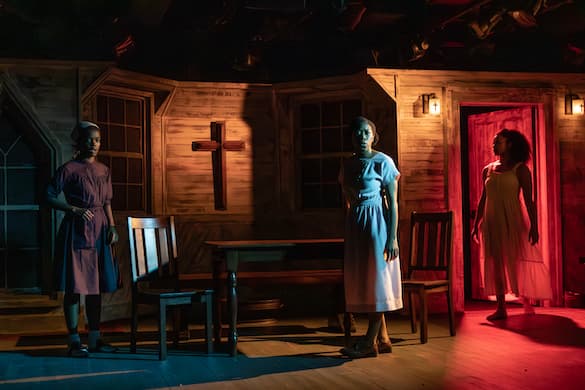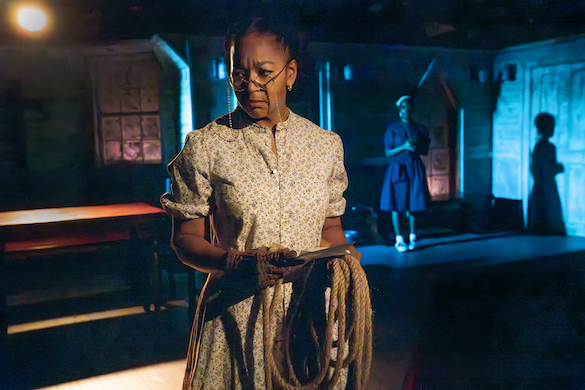‘Covenant’ Offers Briskly Entertaining Food for Thought About the Demons That Haunt Us All
Off-Broadway’s intimate Black Box Theatre is an ideal space for this tale from a rising playwright, York Walker, that echoes the legend of a blues guitar legend, Robert Johnson.

Before rock ’n’ roll became known as the devil’s music, Lucifer was attached to one of its key ancestors: the blues. Fans of both genres are familiar with the legend holding that Robert Johnson, one of the great blues guitarists, made a Faustian pact in order to master his instrument — a myth no doubt rooted at least in part in the racism that prevailed in the South when Johnson, a Black man born in Mississippi in 1911, practiced his craft.
“Covenant,” the crackling new work by a rising playwright, York Walker, is set in Georgia in 1936, when Johnson began working on a relatively slim but historic collection of recordings, and introduces us to one Johnny “Honeycomb” James, who returns home after a mysterious absence. A stammering naif upon his departure, Johnny — played in this world premiere production by a strapping, gently charismatic Chaundre Hall-Broomfield — is now a smooth talker, and he has acquired superior skills as both a guitarist and a singer.
Rumors about this transformation run rife in his small town, and naturally point in one direction — to a satanic bargain, struck up in a graveyard where Johnny was spotted one night before suddenly disappearing. So when Johnny begins courting Avery, a local beauty who was his childhood crush, everyone objects — Avery’s hyper-religious Mama; her overlooked younger sister, Violet; and Violet’s friend Ruthie, who we will see is more than the breathless town gossip she suggests initially.
Mind you, each of these women carries personal fears and motives to their take on Johnny and Avery’s fledgling relationship. “Everybody got a secret,” Ruthie tells us at the beginning of the play, and in “Covenant,” those secrets are complicated by shadows of narrow-mindedness and intolerance that extend well beyond race.

Off-Broadway’s intimate Black Box Theatre proves an ideal space to experience the twists and turns and flat-out spookiness that “Covenant” provides throughout its roughly 90-minute duration. Lawrence E. Moten III’s spare set has a spartan cross as its centerpiece, and Cha See’s lighting and Justin Ellington’s eerie music and sound design conspire with the vivid performances — directed with vigor by Tiffany Nichole Greene — to furnish thrills and chills befitting a juicy horror movie.
At times, the actors, who appear on the same level and in close proximity to audience members, seem to pop up or vanish like ghosts — emerging from the dark in a spotlight, or running toward or from an apparently sinister force. A strong gust of wind can be felt at one point, but Steve Cuiffo’s illusions are mostly subtle, so that the focus remains on Mr. Walker’s canny storytelling.
While Mr. Hall-Broomfield proves a commanding presence, the richest passages in “Covenant” are those that focus on the female characters, both as individuals and in their complex relationships. Jade Payton is by turns elegant, playful, and creepy in mining Avery’s harrowing journey, while Crystal Dickinson slowly, poignantly discloses the pain behind Mama’s zealotry.
Lark White and Ashley N. Hildreth are especially affecting as, respectively, Ruthie and Violet, who in a couple of lighter moments get high on moonshine, as if trying to relieve their growing concerns. Ruthie emerges as the play’s real anchor, in fact, and Ms. White, both wide-eyed and fierce, handles the task with mesmerizing potency.
“Everything started with him,” Ruthie insists early on, referring to Johnny, but the accusation is born of desperate denial. With “Covenant,” Mr. York has given us briskly entertaining food for thought about the demons that haunt us all, individually and collectively.

